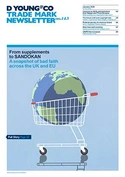Pfizer v Orifarm: SPCs and parallel imports
Since 2000, the European Union has expanded from 17 to 28 member states. The integration of those states has given rise to a number of issues in the field of intellectual property. With regard to supplementary protection certificates (SPCs), one issue which has arisen is whether the holder of an SPC could prevent the import of a product into an existing member state from a new member state where it could not have been given patent protection in the new member state before accession.
In Pfizer Ireland Pharmaceuticals, Operations Support Group v Orifarm GmbH (C-681/16), the Court of Justice of the European Union (CJEU) has addressed this question, answering broadly in the affirmative.
Pfizer was the owner of an SPC covering the protein etanercept based on European patent No 0 939 121 and the marketing authorisation for Enbrel (etanercept). In October 2012, the German Patent and Trade Mark Office granted a paediatric extension of the SPC to August 2015 under Regulation No 1901/2006 (the Paediatric Regulation).
Pfizer manufactured Enbrel in Germany and marketed it in several other countries for the treatment of arthritis. Orifarm operated as a parallel importer of medicinal products.
In 2012 Orifarm notified Pfizer of its intention to carry out parallel imports mainly from Estonia and Latvia and, from February 2015, from Bulgaria, the Czech Republic, Hungary, Poland, Romania, Slovakia and Slovenia. Pfizer objected.
The Acts of Accession of new member states contain certain exemptions to the free movement of goods between the new member states and existing member states, referred to as the ‘specific mechanisms’. The Act of Accession of 2003 reads as follows:
“With regard to the Czech Republic, Estonia, Latvia, Lithuania, Hungary, Poland, Slovenia or Slovakia, the holder, or his beneficiary, of a patent or supplementary protection certificate for a pharmaceutical product filed in a Member State at a time when such protection could not be obtained in one of the above mentioned new Member States for that product, may rely on the rights granted by that patent or supplementary protection certificate in order to prevent the import and marketing of that product in the Member State or States where the product in question enjoys patent protection or supplementary protection, even if the product was put on the market in that new Member State for the first time by him or with his consent.
Any person intending to import or market a pharmaceutical product covered by the above paragraph in a Member State where the product enjoys patent or supplementary protection shall demonstrate to the competent authorities in the application regarding that import that one month’s prior notification has been given to the holder or beneficiary of such protection.”
Similar provisions exist in the Act of Accession 2005 for Bulgaria and Romania and the Act of Accession 2012 for Croatia.
It was common ground between the parties that “on the date on which the application for the basic patent was filed, namely 31 August 1990, it was impossible to obtain equivalent protection for the product at issue in the main proceedings in all of the new Member States in question and that, on the date on which the application for the SPC at issue was filed, namely 26 June 2003, it was possible to obtain protection of that product by means of an SPC in all those new Member States, with the exception of Croatia.”
In June 2015 Pfizer brought proceedings before the Landgericht Düsseldorf (Regional Court, Düsseldorf, Germany) for infringement of the SPC. Orifarm argued that the specific mechanisms were inapplicable on the ground that on the date of the filing of the application for the SPC at issue, equivalent protection should have been obtained in the new member states in question. In that regard, it submitted that the basic patent and the SPC must be considered separately. The Landgericht Düsseldorf referred the issue to the CJEU asking four questions.
The first and second questions boiled down to asking the precise date in respect of which the level of protection in the importing member state and the level of protection in the exporting states should be compared for the purpose of applying the specific mechanisms (for example, the filing date of the basic patent, publication date of the basic patent or filing date of the SPC). The CJEU, following the Advocate General’s opinion, held as follows:
“[The Acts of Accession] must be interpreted as authorising the holder of an [SPC] issued in a Member State other than the new Member States referred to in those Acts of Accession to oppose the parallel importation of a medicinal product from those new Member States in a situation where the legal systems of those States provided for the possibility of obtaining equivalent protection at the time when the application for the basic patent was published and/or the application for a supplementary protection certificate in the importing Member State was filed, but did not yet provide for such a possibility at the time when the application for a basic patent was filed ...”
The third and fourth questions were directed towards whether the specific mechanisms must be interpreted as applying to the paediatric extension. Here the CJEU held as follows
“… it cannot be inferred from the fact, raised by the defendant in the main proceedings during the written and oral parts of the procedure before the Court, that the provisions establishing the Specific Mechanisms do not expressly mention the SPC extension and that [the Paediatric Regulation] was not part of the EU acquis at the time when the Acts of Accession of 2003 and 2005 were concluded, that that extension does not come within the scope of those mechanisms.”
It concluded “the specific mechanisms must be interpreted as applying to the extension provided for in [the Paediatric Regulation]”.
Full decision
Pfizer Ireland Pharmaceuticals, Operations Support Group (Patent law - Whether applicable to parallel imports - Judgment) [2018] EUECJ C-681/16 (21 June 2018) - full case decision for ECLI:EU:C:2018:484, [2018] EUECJ C-681/16, EU:C:2018:484 can be viewed on Bailii:
Full bailii decision
